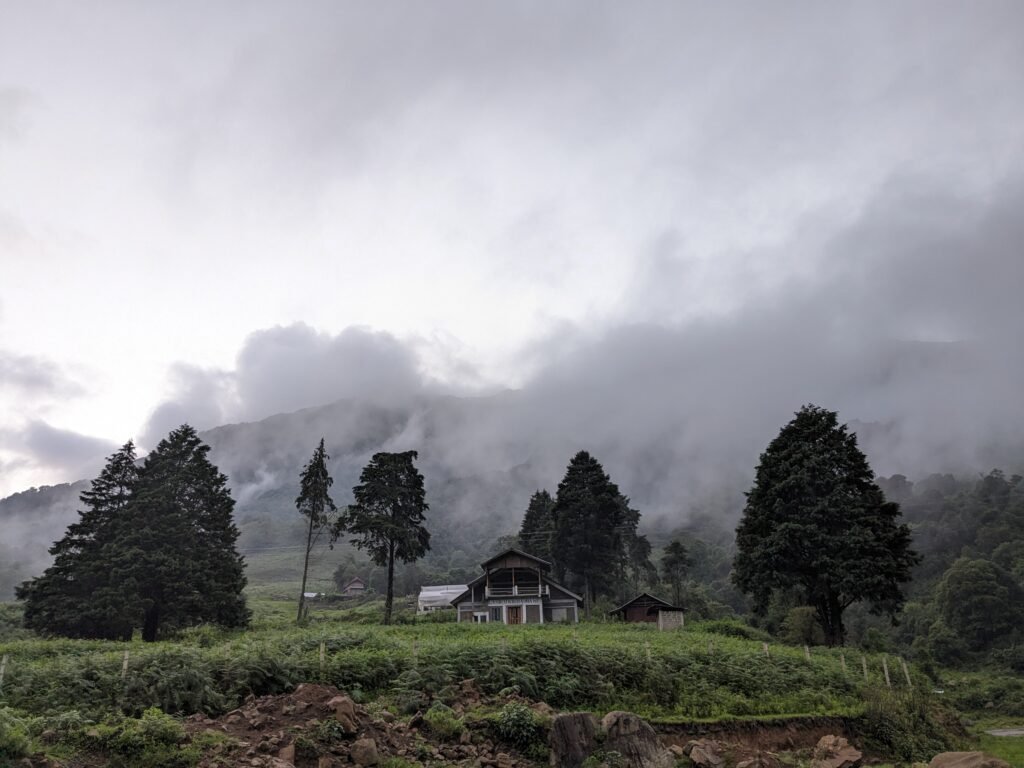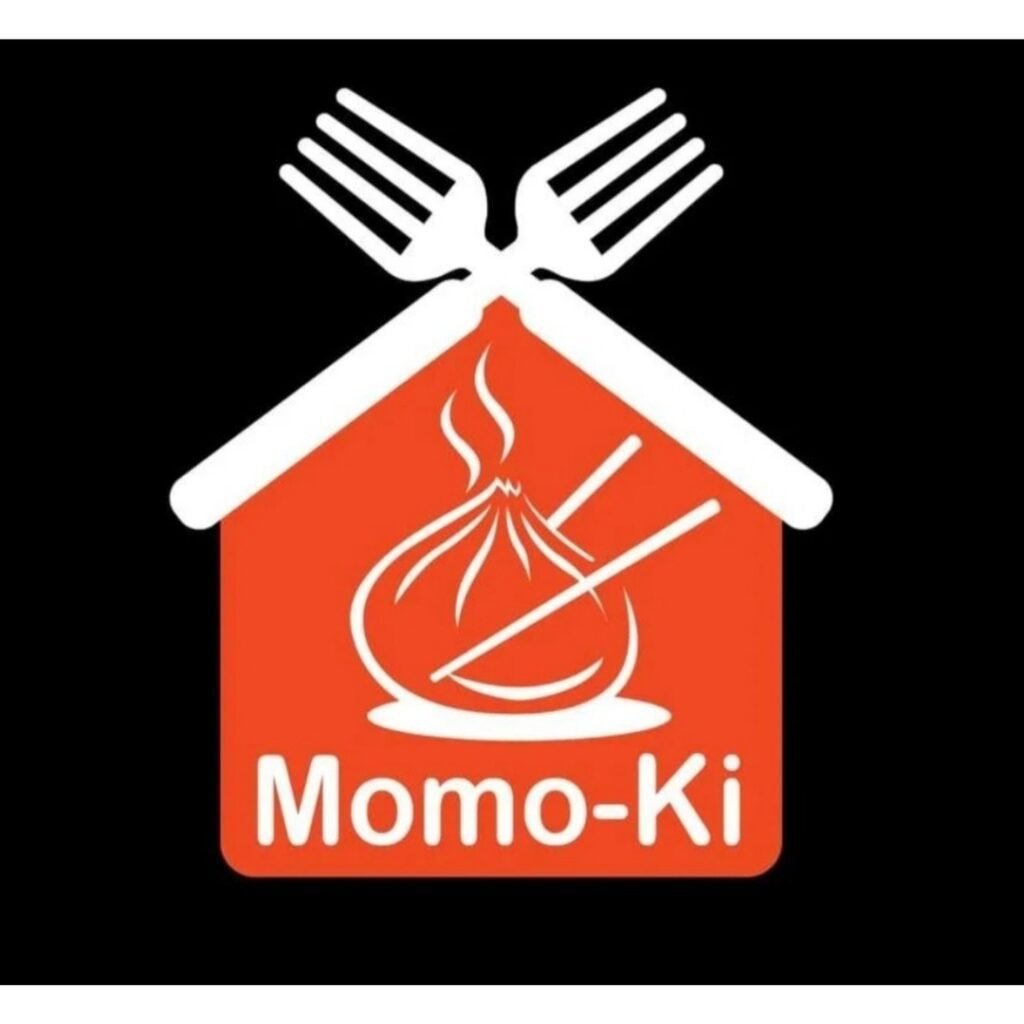Nagaland is renowned for its diverse tribal cultures and vibrant festivals. One such festival that holds a special place in the hearts of the Sumi Naga tribe is the Tuluni Festival. Celebrated with great enthusiasm during the summer, the festival marks the onset of the bountiful harvest season and is a time of joyous revelry for the entire community.
Origins and Significance
The Tuluni Festival is deeply rooted in the agricultural heritage of the Sumi Naga tribe. Traditionally an agrarian community, the festival is a way for the Sumi Naga people to express their gratitude to the gods and spirits of nature for bestowing them with a rich harvest. It also serves as an occasion to seek blessings for a prosperous agricultural year ahead.
The Tuluni Festival is a traditional and culturally significant celebration observed by the Sumi Naga tribe in Nagaland, northeastern India.
The origin of the Tuluni Festival can be traced back to the ancient agricultural practices of the Sumi Naga tribe. Historically, Nagaland has been an agrarian society, heavily dependent on farming for sustenance and livelihood. The festival marks the transition from sowing to harvesting, a critical period for the agricultural community.
The exact historical origin of the festival might be challenging to pinpoint, as it is deeply ingrained in the oral traditions and folklore of the Sumi Naga tribe. However, it is believed to have been celebrated for centuries, passed down through generations as an integral part of their cultural identity.
Significance
- Thanksgiving to Deities: The Tuluni Festival is primarily a way for the Sumi Naga people to express their gratitude to the gods and spirits of nature for providing them with a bountiful harvest. The festival acts as a form of thanksgiving for the agricultural abundance and acknowledges the divine forces that play a role in the prosperity of their crops.
- Agricultural Significance: As an agrarian society, the well-being of the Sumi Naga community is closely tied to successful harvests. The festival serves as an occasion to pray for a fruitful harvest in the coming season and to seek blessings for a prosperous agricultural year ahead. It is also a time for farmers to take a brief respite from their arduous labour and celebrate the fruits of their hard work.
- Cultural Identity: The Tuluni Festival is essential to the Sumi Naga tribe’s cultural identity. Through their traditional dances, songs, rituals, and attire, the festival reinforces a sense of pride in their heritage and helps preserve their unique customs and practices.
- Social Harmony: The festival fosters social harmony and unity among the Sumi Naga people. It is a time when villagers come together, forgetting their differences and grievances, to celebrate as a cohesive community. The communal feasting and cultural performances contribute to a sense of togetherness and solidarity.
- Spiritual Significance: Beyond the agricultural aspects, the festival also holds spiritual significance. The rituals and ceremonies conducted during Tuluni are believed to appease the deities and spirits, seeking their blessings for the welfare and protection of the community.
- Tourism and Cultural Exchange: In recent years, the Tuluni Festival has gained attention beyond the local community, attracting tourists and visitors from various parts of India and the world. This cultural exchange allows outsiders to learn about the unique traditions and customs of the Sumi Naga tribe, promoting understanding and appreciation for their way of life.
Timing and Duration
The Tuluni Festival typically takes place in July, at the peak of the summer season, when the crops are ready for harvesting. The festivities usually span over a week, during which the entire village comes alive with various cultural activities and rituals. As for the duration, the Tuluni Festival is a week-long affair, lasting approximately seven days. During this period, the festivities are in full swing, and the Sumi Naga community comes together to participate in various cultural activities, rituals, and feasting. The entire village gets engrossed in the celebratory spirit, making it a vibrant and joyous occasion.
The festival’s first day is marked by specific rituals and ceremonies, often performed by village elders or priests, to invoke the blessings of the deities and spirits for a successful harvest and a prosperous year ahead. Cultural performances, such as traditional dances, songs, and music, commence from the beginning and continue throughout the festival.
The feasting, an integral part of the Tuluni Festival, begins on the first day and extends throughout the week. The communal feast is a time for the community to share traditional delicacies and rice beer (Zutho) as a gesture of camaraderie and togetherness.
Additionally, various traditional sports and games, including wrestling and archery competitions, are organised during the festival, providing entertainment and opportunities to showcase physical prowess and skills.
The Tuluni Festival is filled with cultural vibrancy, religious significance, social bonding, and agricultural celebrations. It highlights the Sumi Naga calendar and is an attractive cultural experience for tourists and visitors worldwide.
Rituals and Ceremonies
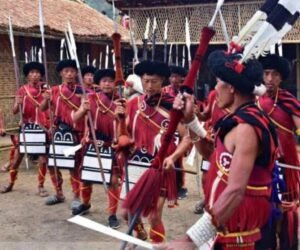
The festival commences with various rituals performed by the village elders and priests. These rituals are held to invoke the blessings of the deities and spirits for the community’s well-being. Traditional prayers and offerings are made, and the villagers seek protection from any potential calamities in the upcoming agricultural cycle.
- Invocation and Prayers: The festival starts with the solemn act of invoking the blessings of the gods and spirits. Village elders, priests, or shamans lead the prayers and perform rituals to honour the deities. They seek protection from potential calamities, thank the divine forces for the past year’s harvest, and pray for a successful agricultural season.
- Offerings and Sacrifices: As part of the prayers and rituals, offerings and sacrifices are made to appease the gods and spirits. These offerings often include rice, fruits, flowers, and symbolic items. The sacrifices might involve animals, such as chickens or pigs, in accordance with local customs and beliefs.
- Traditional Dances and Music: Cultural performances, especially traditional dances and music, play a central role in the Tuluni Festival. Various dance forms are performed during the festivities, each with unique significance and symbolism. The dances often depict stories from their mythology or portray themes related to nature, agriculture, and community life.
- Ceremonial Attire: The participants don their finest traditional attire during the festival. The colourful and intricately designed costumes hold cultural significance and represent the community’s identity. Adorned in their traditional finery, the villagers immerse themselves in the celebratory spirit.
- Community Feasting: The Tuluni Festival is synonymous with grand communal feasts. The entire village comes together to prepare and share traditional delicacies. The feast is essential to the festival, fostering a sense of togetherness and unity among the community members.
- Wrestling and Archery Competitions: Traditional sports and games, such as wrestling and archery, are organised during the festival. These events not only provide entertainment but also showcase the physical skills and prowess of the participants. Winners are often regarded with honour and pride.
- Cleansing Rituals: Some villages may also conduct cleansing rituals during the Tuluni Festival. These rituals cleanse the village and its inhabitants of any impurities or negative energies, ensuring a fresh start for the new agricultural cycle.
- Cultural Shows and Exhibitions: Apart from traditional dances, the festival might include various cultural shows, exhibitions, and handicraft displays. These events showcase the artistry and craftsmanship of the Sumi Naga people, providing an insight into their cultural heritage.
Cultural Extravaganza
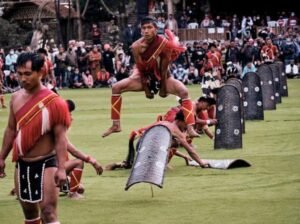
The Tuluni Festival is a vibrant display of the rich cultural heritage of the Sumi Naga tribe. Traditional dances, songs, and music are integral to the festivities. The young and old attend these performances, donning their colourful and intricately designed traditional attire. Each dance and song has a unique significance, often narrating stories from their folklore and history.
The Tuluni Festival is a cultural extravaganza that showcases the vibrant heritage of the Sumi Naga tribe in Nagaland. It is a time of joyous celebration and cultural expression, where the community comes together to revel in their traditional arts, music, dances, and rituals. The cultural extravaganza of the Tuluni Festival includes the following elements:
- Traditional Dances: Dance is a centrepiece of the Tuluni Festival. The Sumi Naga tribe has a rich repertoire of traditional dances, each with significance and symbolism. Men and women, adorned in their colourful traditional attire and elaborate ornaments, perform these dances with grace and enthusiasm. The rhythmic movements and intricate steps are a visual delight, and the dances often narrate stories from their mythology, depict aspects of nature, or celebrate their agrarian lifestyle.
- Music and Folk Songs: Music is integral to the cultural extravaganza. Traditional musical instruments, such as drums, gongs, bamboo flutes, and shawms, accompany the dances and performances. Folk songs with melodious tunes resonate with the festival’s themes, expressing their joys, hopes, and gratitude to the deities and nature.
- Traditional Attire and Ornaments: The festival is when the Sumi Naga people showcase their finest traditional attire. Men wear colourful shawls, loincloths, and headgear adorned with feathers and beads, while women don elegant woven shawls and handcrafted jewellery. The attire reflects their cultural identity and is a source of pride for the community.
- Rituals and Ceremonies: The cultural extravaganza is intertwined with the religious rites and ceremonies of the festival. The community gathers to witness and participate in these rituals, which include prayers, offerings, and invocations to seek blessings for a successful harvest and well-being. The ceremonies are performed by village elders, priests, and shamans who hold vital roles in preserving their spiritual traditions.
- Traditional Sports and Games: The festival also includes traditional sports and games, adding an element of excitement and competitiveness to the celebrations. Wrestling and archery competitions are particularly popular during the Tuluni Festival, and participants display their physical prowess and skills in front of the cheering crowd.
- Cultural Exhibitions: The Tuluni Festival often features exhibitions that showcase the artistic talents of the Sumi Naga people. Handicrafts, artwork, and traditional artifacts are displayed, allowing visitors to appreciate the craftsmanship and creativity of the community.
- Communal Feasting: Food is an essential part of the cultural extravaganza. The community comes together for grand communal feasts, where traditional delicacies are prepared and shared. The feasting fosters a sense of unity and camaraderie among the villagers, enhancing the festive spirit of the occasion.
- Social Bonding and Cultural Exchange: The Tuluni Festival is a platform for social bonding and cultural exchange. People from different villages and neighbouring tribes often join the festivities, creating a vibrant cultural diversity and harmonious atmosphere.
Feasting and Merriment
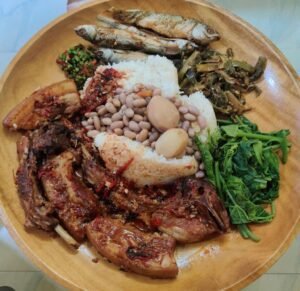
Feasting and merriment are integral to the Tuluni Festival, making it a joyous celebration and communal bonding for the Sumi Naga tribe in Nagaland. During this auspicious occasion, the community comes together to enjoy a grand communal feast and engage in various festivities, creating an atmosphere of exuberance and togetherness. Here are the key aspects of the feasting and merriment during the Tuluni Festival:

- Communal Feast: The festival is marked by a lavish communal feast in which the entire village participates. The feast reflects the agrarian lifestyle of the Sumi Naga people as it celebrates the successful harvest season. The community members contribute various traditional delicacies, prepared with care and shared among all attendees. The feast symbolises unity and harmony, as everyone comes together to enjoy the abundance of the harvest.
- Traditional Delicacies: The menu for the communal feast includes a wide array of traditional dishes, each with its unique flavour and significance. Rice, being a staple food, forms the foundation of the meal. Other dishes may include meat curries (pork and chicken), bamboo shoot-based recipes, fermented vegetables, chutneys, and pickles. Special sweet dishes and snacks are also prepared to add a touch of sweetness to the festivities.
- Rice Beer (Zutho): Rice beer, locally known as Zutho, is significant during the Tuluni Festival. It is a traditional alcoholic beverage made from fermented rice and is central to the celebration. Zutho is generously served to guests and participants as a gesture of hospitality and camaraderie. Sharing and drinking Zutho together foster community and friendship among the villagers.
- Cultural Performances: The feasting is accompanied by vibrant cultural performances, including traditional dances, songs, and music. These performances add a lively and festive ambience to the celebrations. The rhythmic beats of drums and the melodious tunes of folk songs set the tone for merriment, and people enthusiastically join in the dancing and singing.
- Social Bonding: The communal feasting and merriment provide an opportunity for social bonding and strengthening of relationships within the community. It is when old friends reunite, families come together, and new acquaintances are made. The shared experience of the festival fosters a sense of belonging and solidarity among the villagers.
- Exchange of Gifts and Blessings: The Tuluni Festival is also a time for exchanging gifts and blessings. People exchange traditional tokens of goodwill as a sign of appreciation and love. Elders bless the younger community members, and families visit one another to exchange greetings and good wishes for the upcoming year.
- Hospitality to Visitors: The Tuluni Festival is known for its warm hospitality to visitors and guests. Travellers from neighbouring villages or other parts of the region are welcomed with open arms and invited to partake in the festivities. The spirit of hospitality and inclusiveness enhances the overall joy and celebration of the event.
The Tuluni Festival is a mesmerising showcase of the rich cultural tapestry and agrarian roots of the Sumi Naga tribe. The festival embodies the spirit of gratitude, joy, and togetherness through its blend of rituals, dances, feasting, and sporting events. As Nagaland’s vibrant summer celebration, the Tuluni Festival continues to captivate hearts and minds, leaving an indelible mark on all who can partake in its summertime revelry.

